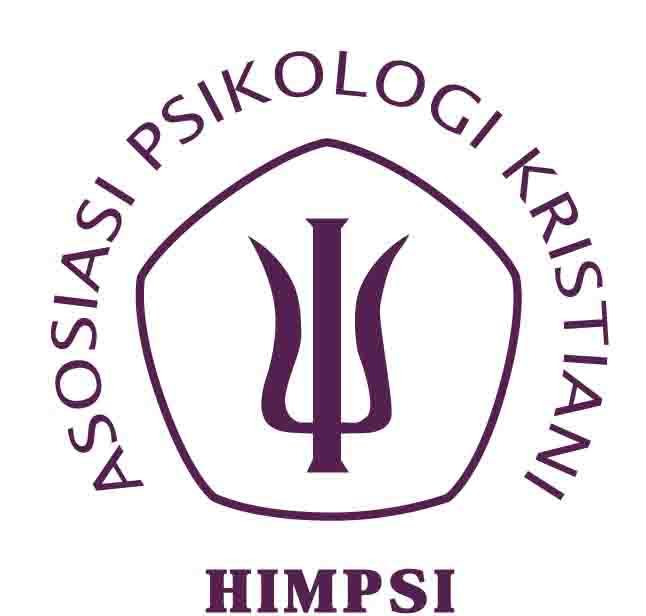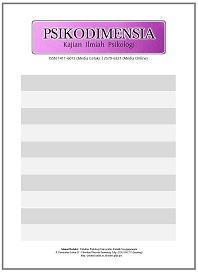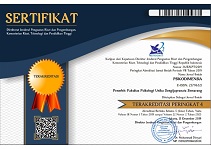Effectiveness of PEDE Training for The Psychological Well-Being of Women
Abstract
Every individual will experience various pleasant or unpleasant events, including women. One of unpleasant experience is domestic violence. Some forms of fear and stress experienced by victims will lead to behavior that can hinder their daily activities. For this reason, treatment needs to be carried out by helping them to have abilities and improving their quality of life through psychological well-being. PEDE (Forgiveness, Self-Efficacy and Empathy) training aims to improve the psychological well-being of women from an internal perspective through three main training elements. This research used a quasi-experiment method and non-randomized one group pre-test post-test design involving 30 women from Palam Village Banjarbaru. The research results show that PEDE training is effective in improving the psychological well-being of women in Palam Village. It is hoped that this training in forgiveness, self-efficacy and empathy can be applied in everyday life as a form of strengthening the family, and an effort to reduce the mental burden of the problems experienced so as to achieve the psychological well-being of women in the family.
Keywords
Full Text:
PDFReferences
Adams, R.J. (1973). Building a foundation for evaluation of instruction in higher education and continuing education (Doctoral dissertation). Retrieved from http://www.ohiolink.edu/etd/
Alwisol, A. (2009). Teknik konseling desensitisasi versus psikoanalisis. Ilmu Pendidikan: Jurnal Kajian Teori dan Praktik Kependidikan, 22(2).
Amalia, H. P., Setyowati, T., Purwanto, A., Indojacmiko, & Lestari, S. (2022). Pelatihan pemaafan untuk meningkatkan kesejahteraan subjektif wanita korban kdrt. Jurnal Pengabdian Masyarakat
Indonesia (JPMI), 2(1), 45-51. https://doi.org/10.52436/1.jpmi.437
Anindya, A. S., & Soetjiningsih, C. H. (2017). Kepuasan perkawinan dengan kesejahteraan subjektif perempuan dengan profesi guru sekolah dasar. INSAN Jurnal Psikologi dan Kesehatan Mental, 2(1), 45-
https://dx.doi.org/10.20473/jpkm.V2I12017.44-50
Annisa & Zulkarnain. (2013). Komitmen terhadap organisasi ditinjau dari kesejahteraan psikologis pekerja. Insan, 2(1), 54-62.
Asnawati, D. (2017). Hubungan antara pemaafan dengan happiness pada korban kdrt. Jurnal Dakwah dan Komunikasi Islam, 3(1), 1-11. Retrieved from
https://www.ejournal.iaisyarifuddin.ac.id/index.php/dakwatuna/article/view/223/162
Astini L., safarina, N. A., & Suzanna, E. (2022). Gambaran kesejahteraan psikologis wanita menikah dari keluarga bercerai. Jurnal Penelitian Psikologi, 13(1), 21-30. http://doi.org/10.29080/jpp.v13i1.685
Barlow, J., Powell, L., & Gilchrist, M. (2006). The influence of the training and support programme on the self-efficacy and psychological well-being of parents of children with disabilities: A controlled
trial. Complementary Therapies in Clinical Practice, 12(1), 55-63. https://doi.org/10.1016/j.ctcp.2005.02.005
Baron, A. R., & Byrne, D. (2005). Psikologi Sosial (Jilid 1 & 2, edisi kesepuluh). Erlangga.
Bergersen, H., Froslie, K. F., Sunnerhagen, K. S., & Schanke, A. K. (2010). Anxiety, depression, and psychological well-being 2 to 5 years poststroke. Journal of Stroke and Cerebrovascular Diseases, 19(5),
-369. https://doi.org/10.1016/j.jstrokecerebrovasdis.2009.06.005
Boonyarit, I., Chuawanlee, W., Macaskill, A., & Supparerkchaisakul, N. (2013). A psychometric analysis of the workplace forgiveness scale. Europe’s Journal of Psychology, 9(2), 319-338.
https://doi.org/10.5964/ejop.v9i2.551
Braithwaite, S. R., Selby, E. A., & Fincham, F. D. (2011). Forgiveness and relationship satisfaction: Mediating mechanisms. Journal of Family Psychology, 25(4), 551-559. https://doi.org/10.1037/a0024526
Brown, R.P. (2003). Measuring individual differences in the tendency to forgive: Construct validity and links with depression. Personality and Social Psychology Bulletin, 29(6), 759-771.
https://doi.org/10.1177/0146167203029006008
Cahyani, L. I., Widhianingtanti, L. T., & Satyajati, M. W. (2021). Seni bersahabat (SEBAT): sebuah program untuk meningkatkan psychological well-being pada karyawan. Jurnal Sains Psikologi, 10(2), 101-
http://dx.doi.org/10.17977/um023v10i22021p101-108
Damariyanti, M. (2017). Pengaruh Kesejahteraan Psikologis Dan Pemaafan Terhadap Kepuasan Penikahan. Jurnal Psikologi, 8(2). Retrieved from
https://ejournal.gunadarma.ac.id/index.php/psiko/article/view/1642
Damariyanti, M. (2020). Adult attachment, pemaafan dan kesejahteraan psikologis pada individu menikah. Jurnal Psikologi, 13(1), 1-14. https://doi.org/10.35760/psi.2020.v13i1.2567
Deasyanti, D., & Mafazi, A. (2016). Efikasi Dan Kesejahteraan Psikologis Pada Guru Smp. JPPPJurnal Penelitian dan Pengukuran Psikologi, 5(2), 77-84. https://doi.org/10.21009/JPPP.052.04
Depaulo, B. M. (2004). The scientific study of people who are single: an annotated bibliography. Academic advisory board of spectrum institute, research and policy division of the American association
for single people (AASP), Glendale, CA, USA.
Dogan, T., Totan, T., & Sapmaz, F. (2013). The role of self-esteem, psychological wellbeing, emotional self-efficacy, and affect balance on happiness: a path model. European Scientific Journal, 9(20), 31-
Retrieved from https://citeseerx.ist.psu.edu/document?repid=rep1&type=pdf&doi=8155b8528985ced1d3294d8ec87d7a225b7a3168
Duffy, C. (2016). Relationship between Women's Empathy and Their Experience of Violent Intimate Relationships: An Exploratory Study (Doctoral dissertation, University of Minnesota). Retrieved from
https://conservancy.umn.edu/bitstream/handle/11299/181721/Duffy_umn_0130E_17173.pdf?sequence=1
Fadhil, A. (2021). Evaluasi property psikometris skala psychological well-being (PWB) versi Indonesia. Jurnal Psikologi Universitas Negeri Padang, 5(2), 4666-4674. Retrieved from
https://download.garuda.kemdikbud.go.id/article.php?article=2254221&val=13365&title=Evaluasi%20Properti%20Psikometris%20Skala%20Psychological%20Well-Being%20PWB%20Versi%20Indonesia
Faulkner, R. A., Davey, M., & Davey, A. (2005). Gender-related predictors of change in marital satisfaction and marital conflict. The American Journal of Family Therapy, 33(1), 61-83.
https://doi.org/10.1080/01926180590889211
Freedman, S., & Enright, R. D. (2017). The use of forgiveness therapy with female survivors of abuse. Journal of Women's Health Care, 6(3), 2167-0420. https://doi.org/10.4172/2167-0420.1000369
Freeman, M., Chinkin, C., & Rudolf, B. (2012). The UN Convention on the Elimination of All Forms of Discrimination Against Women: A Commentary. Oxford University Press.
Habibi, M. M., & Hidayati, F. (2017). Hubungan antara pemaafan diri sendiri, pemaafan orang lain, dan pemaafan situasi dengan resiliensi pada mahasiswa baru (Studi korelasi pada mahasiswa baru
Universitas Diponegoro Semarang). Jurnal Empati, 6(2), 62-69. https://doi.org/10.14710/empati.2017.19731
Hartarto, I., Basaria, D., & Patmonodewo, S. (2017). Terapi well-being untuk meningkatkan psychological well-being pada remaja yang tinggal di panti sosial bina remaja x. Jurnal Psikologi Psibernetika,
(1), 20-29. http://dx.doi.org/10.30813/psibernetika.v10i1.1038
Hasan, S. (Maret 8, 2023). Kekerasan Terus Meningkat terhadap Perempuan dan Anak Kalsel. Antara News Kalsel [Online]. Accessed from https://kalsel.antaranews.com/berita/363366/kekerasan-terus-
meningkat-terhadap-perempuan-dan-anak-di-kalsel
Hasanah, D. U. (2016). Kekerasan dan diskriminasi terhadap perempuan dalam pandangan hukum. HARKAT: Media Komunikasi Islam tentang Gender dan Anak, 12(2), 109-116.
Jannah, R., Haryanto, J., & Kartini, Y. (2020). Hubungan antara self efficacy dengan kesejahteraan psikologis caregiver dalam merawat lansia skizofrenia di rsj dr. radjiman wediodiningrat lawang malang:
The Relationship of Self Efficacy with the Caregiver’s Psychological Well Being Who Taking Care for Elderly Schizophrenia at Psychiatric Hospital Dr. Radjiman Wediodiningrat Lawang Malang. Jurnal
Ilmiah Keperawatan (Scientific Journal of Nursing), 6(1), 1-5. https://doi.org/10.33023/jikep.v6i1.330
Karremans, J. C., Van Lange, P. A. M., Ouwerkerk, J. W., & Kluwer, E. S. (2003). When forgiving enhances psychological wellbeing: The role of interpersonal commitment. Journal of Personality and
Social Psychology, 84(5), 1011-1026. https://psycnet.apa.org/doi/10.1037/0022-3514.84.5.1011
Keyyes, C. L. M., Shmotkin, D., & Ryff, C. D. (2022). Optimizing well-being: the empirical encounter of two traditions. Journal of Personality and Social Psychology, 82(6), 1007-1022.
https://psycnet.apa.org/doi/10.1037/0022-3514.82.6.1007
Khajeh, A., Baharloo, G., & Soliemani, F. (2014). The relationship between psychological well-being and empathy quotient. Management Science Letters 4(6), 1211-1214.
https://doi.org/10.5267/j.msl.2014.5.005
Kolb, D. A., Boyatzis, R. E., & Mainemelis, C. (2001). Experiential learning theory: Previous research and new directions. In L. Zhang (Ed.), Perspectives on thinking, learning, and cognitive styles (227-247).
Lawrence Erlbaum Associates.
Konrath, S.H., O’Brien, E.H., & Hsing, C. (2011). Changes in dispositional empathy in American college students over time: A meta-analysis. Personality and Social Psychology Review, 15 (2), 180–198.
https://doi.org/10.1177/1088868310377395
Kusbadini, W., & Suprapti, V. (2014). Psychological well being perempuan dewasa awal yang pernah mengalami kekerasan dalam pacarana. Jurnal Psikologi Kepribadian dan Sosial, 3(2), 80-92. Retrieved
from https://journal.unair.ac.id/download-fullpapers-jpksb96837bbd0full.pdf
Lopez, S. J. (2009). In The Encyclopedia of Positive Psychology, 1, 1030-1034. Balckwell Publishing Ltd.
Luthans, F., Youssef, C. M., & Avolio, B. J. (2007). Psychological Capital: Developing the Human Competitive Edge. Oxford University Press.
Maisah, M., & Yenti. (2016). Dampak psikologis korban kekerasan dalam rumah tangga di kota Jambi. ESENSIA: Jurnal Ilmu-Ilmu Ushuluddin, 17(2), 265-277. https://doi.org/10.14421/esensia.v17i2.1292
Magalhães, E., Grych, J., Ferreira, C., Antunes, C., Prioste, A. & Jongenelen, I. (2021). Interpersonal violence and mental health outcomes: mediation by self-efficacy and coping. Victims and Offenders.
N/A. https://dx.doi.org/10.1080/15564886.2021.1880508
Martha, K., & Kurniati, N. M. T. (2018). Efektivitas terapi pemaafan dengan model proses dari Enright untuk membantu remaja korban perceraian dalam memaafkan orang tua. Jurnal Psikolologi, 11(1),
-24. http://dx.doi.org/10.35760/psi.2018.v11i1.2070
Nath, P., & Pradhan, R. K. (2012). Influence of positive affect on physical health and psychological well-being: Examining the mediating role of psychological resilience. Journal of Health Management,
(2), 161-174. https://doi.org/10.1177/097206341201400206
Nurfazrina, S. A., Muslihin, H. Y., & Sumardi, S. (2020). Analisis kemampuan empati anak usia 5-6 tahun (literature review). Jurnal PAUD Agapedia, 4(2), 285-299. Retrieved from
https://ejournal.upi.edu/index.php/agapedia/article/viewFile/30447/13513
O’Conner, L. E., Rangan, R. K., Berry, J. W., Stiver, D. J., Hanson, R., Ark, W., & Li, T. (2015). Empathy, compassionate altruism and psychological well-being in contemplative practitioners across five
traditions. Psychology, 6(8), 989-1000. https://dx.doi.org/10.4236/psych.2015.68096
Ofovwel, C., E., Ofili, O., G., Ojetu, F., E., Okosun. (2013). Marital satisfaction, job satisfaction and psychological health of secondary school teachers in Nigeria. Health. 5(4), 663-668.
https://doi.org/10.4236/health.2013.54087
Oginyi, R., Ofoke1, S., & Francis, S. (2015). Religiosity, forgiveness and psychological well being as predictor of marital satisfaction among academic staff of Ebonyi State University, South Eastern,
Nigeria. Journal of Education Research and Behavioral Sciences, 4(12), 306-315.
Paphitis, S. A., Bentley, A., Asher, L., Osrin, D., & Oram, S. (2022). Improving the mental health of women intimate partner violence survivors: Findings from a realist review of psychosocial interventions.
PLoS one, 17(3), e0264845. https://doi.org/10.1371/journal.pone.0264845
Pattiradjawane, C., Wijono, S., & Engel, J. D. (2019). Uncovering violence occurring in dating relationship: An early study of forgiveness approach. Psikodimensia, 18(1).
https://doi.org/10.24167/psidim.v18i1.1700
Rachmayani, D., & Ramdhani, N. (2014). Adaptasi bahasa dan budaya skala psychological well-being. Proceeding Seminar Nasional Psikometri. Retrieved from
https://publikasiilmiah.ums.ac.id/xmlui/handle/11617/6417
Rathi, N., & Rastogi, R. (2007). Meaning in life dan kesejahteraan psikologis in pre-adolescents and adolescents. Journal of the Indian Academy of Applied Psychology, 33(1), 31-38.
Rini, M. P., & Kumolohadi, R. R. (2008). Dinamika kesejahteraan psikologis survivor kekerasan seksual. Jurnal Psikologi, 2.
Riswani., Diniaty, A., Rohani., Ernita, M., Afrida., & Hermansyah. (2021). Pemberdayaan psikologi dan keterlibatan perempuan dalam pengelolaan bina keluarga remaja (BKR) di wilayah perbatasan.
Sosial Budaya, 18(2), 97-107. http://dx.doi.org/10.24014/sb.v18i2.15655
Rizati, M. A. (Februari 7, 2023). Ada 25.050 Kasus Kekerasan Perempuan di Indonesia pada 2022. DataIndonesia.id [Online]. Accessed from https://dataindonesia.id/ragam/detail/ada-25050-kasus-
kekerasan-perempuan-di-indonesia-pada-2022
Rustika, I. M. (2012). Efikasi diri: tinjauan teori Albert Bandura. Buletin psikologi, 20(1-2), 18-25. Retrieved from https://journal.ugm.ac.id/buletinpsikologi/article/viewFile/11945/8799
Ryff, C. D. (1989). Happiness is everything, or is it? Exploration of the meaning of psychological well being. Journal of Personality and Social Psychology, 57(6), 1069-1081.
https://psycnet.apa.org/doi/10.1037/0022-3514.57.6.1069
Ryff, C.D. (2014). Psychological well-being revisited: Advances in the science and practice of eudaimonia. Psychotherapy Psychosomatics, 83(1), 10-28. https://doi.org/10.1159/000353263
Ryff, C. D., & Keyes, C. L. M. (1995). The structure of psychological well-being revisited. Journal of Personality and Social Psychology, 69, 719-727. http://dx.doi.org/10.1037/0022- 3514.69.4.719
Ryff, C. D., & Singer, B. H. (2006). Know theyself and become what you are: a eudaemonic approach to psychological well-being. Journal of Happiness Studies, 9, 13-39. https://doi.org/10.1007/s10902-
-9019-0
Safitri, A. M. (2017). Proses dan faktor yang mempengaruhi perilaku memaafkan pada remaja broken home. Psikoborneo, 5(1), 34-40. http://dx.doi.org/10.30872/psikoborneo.v5i1.4328
Sandra, K. I. (2013). Manajemen waktu, efikasi-diri dan prokrastinasi. Persona: Jurnal Psikologi Indonesia, 2(3). https://doi.org/10.30996/persona.v2i3.140
Seniati, L., Yulianto, A., & Setiadi, B. N. (2011). Psikologi Eksperimen. Indeks.
Setyawan, I., & Dewi, E. K. (2019). Efektivitas pelatihan “PEDE” (pemaafan, efikasi diri, dan empati) untuk meningkatkan school well-being siswa. Jurnal Psikologi, 18(2), 218-229.
https://doi.org/10.14710/jp.18.2.218-229
Shourie, S., & Kaur, H. (2016). Gratitide and forgiveness as correlates of well-being among adolescents. Indian Journal of Health and Wellbeing, 7(8), 827-833
Singh, H., & Sharma, U. (2018). Effects of forgiveness on psychological well-being. Indian Journal of Positive psychology, 9(2), 258-262.
Situmorang, N. Z. (2017). Kesejahteraan Subjektif Perempuan Pemimpin Ditinjau dari Peran Optimisme dan Efikasi Diri. Retrieved from https://osf.io/exryq/download
Snyder, C. R., & Lopez, S. J. (2005). Handbook of Positice Psychology. Oxford University Press.
Strauser, D. R., Lustig, D. C., & Ciftci, A. (2008). PSychological Well-Being: Its relation to work personality, vocational identity, and career thoughts. The Journal of Psychology, 142(1), 21-35.
https://doi.org/10.3200/JRLP.142.1.21-36
Stutzer, A., & Frey, B. S. (2006). Does marriage make people happy, or do happy people get married?. The Journal of Socio-Economics, 35(2), 326-347. https://doi.org/10.1016/j.socec.2005.11.043
Suranto & Sugiarti, R. (2021). Efikasi diri terhadap kesejahteraan psikologis guru pendidikan anak usia dini. Altruistik: Jurnal Konseling dan Psikologi Pendidikan, 1(2), 53-60.
https://doi.org/10.24114/altruistik.v1i2.26010
Utami, D. A. (2015). Kepercayaan interpersonal dengan pemaafan dalam hubungan persahabatan. Jurnal Ilmiah Psikologi Terapan, 3(1), 54-70. https://doi.org/10.22219/jipt.v3i1.2126
Van der Wal, R. C.., Karremans, J. C., & Cillessen, A. H. N. (2016). Interpersonal Forgiveness and Psychological Wellbeing in Late Childhood. Merrill-Palmer Quarterly, 62(1), 1–21.
https://doi.org/10.13110/merrpalmquar1982.62.1.0001
Vazquez, C., Hervas, G., Rahona, J. R., & Gomez, D. (2009). Psychological well-being and health. Contributions of Positive Psychology. Annuary of Clinical and Health Psychology, 5, 15-27. Retrieved from
https://hdl.handle.net/11441/132721
Vinayak, S., & Judge, J. (2008). Resilience and empathy as predictors of psychological wellbeing among adolescents. International Journal of Health Sciences and Research, 8(4), 192-200. Accessed from https://www.ijhsr.org/IJHSR_Vol.8_Issue.4_April2018/29.pdf
Wahyuningsih, A., & Surjaningrum, E. (2013). Kesejahteraan psikologis pada orang dengan lupus (odipus) wanita usia dewasa awal berstatus menikah. Jurnal Psikologi Klinis dan Kesehatan Mental, 2(1),
-8. Retrieved from https://journal.unair.ac.id/filerPDF/jpkk07caff88e8full.pdf
Wardani, L. M. I., Syaputra, R. D., Kartikawati, M. S., Sekarini, D. A. (2021). I’m Mismatch, But I’m Well-Being: Employee Well-Being, Job Crafting, dan Psychological Empowerment. Penerbit CV. Pena
Persada.
Warsah, I. (2020). Forgiveness viewed from positive psychology and islam. Islamic Guidance and Counseling Journal, 3(2), 108-121. https://doi.org/10.25217/igcj.v3i2.878
Wells, I. E. (2010). Psychological Well-being. Nova Science Publisher.
DOI: https://doi.org/10.24167/psidim.v22i2.11092
Print ISSN : 1411-6073 | online ISSN : 2579-6321 View My Stats

This work is licensed under a Creative Commons Attribution 4.0 International License.





















